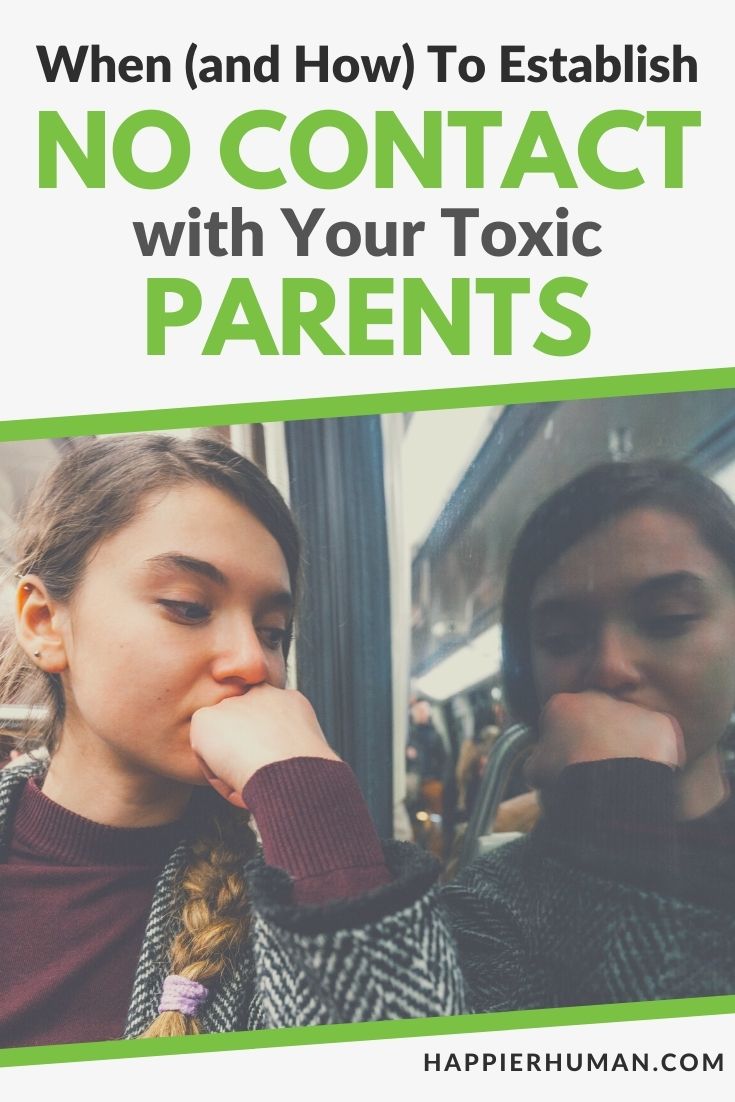There might be affiliate links on this page, which means we get a small commission of anything you buy. As an Amazon Associate we earn from qualifying purchases. Please do your own research before making any online purchase.
Your toxic parents have pushed you to the edge, and you’ve had enough. You’re ready to sever the relationship to stop the madness, abuse, and violation of boundaries. You just need to figure out when and how to go no contact with parents.
Take a deep breath. This article explains when and how to sever contact, why it happens, pros and cons, what to expect, and how to create your new life successfully.
(Side note: One of the best ways to increase your happiness and life satisfaction is to plan your day, so you focus on your TOP goals. To get started, watch this free video that details the 7-minute habit for planning your day to focus on what's important.)
What You Will Learn
- What is “No Contact?”
- Reasons Adult Children Sever Contact with Parents
- Pros and Cons of Having No Contact with Parents
- When to go No Contact with Parents
- Be absolutely certain it is what you want to do.
- You may want to talk to your parents first.
- Have you exhausted support groups, counseling, and everything else?
- Don’t feel guilt or shame; just be sure and stick to your decision.
- If you are in danger of physical, emotional, or mental distress, remove yourself.
- How to go “No Contact” with Your Parents
- 1. Have reasonable expectations.
- 2. Learn how to begin.
- 3. Release guilt or shame and stick with your decision.
- 4. Realize it isn’t your job to fix the toxic relationship or hold the family unit together.
- 5. Expect a grieving process.
- 6. Create a new network of handpicked family and friends.
- 7. Meditate.
- 8. Be kind to yourself and take care of yourself.
- 9. Seek counseling, therapy, or support groups to help you along the journey.
- 10. Consider doing volunteer work.
- 11. Live a life of gratitude.
- Final Thoughts on No Contact with Parents
What is “No Contact?”
To go “no contact” with toxic parents is to estrange oneself from the relationship with them. An adult child may choose to sever the relationship to end physical, psychological, or emotional suffering. “No contact” means no communication or interaction whatsoever with the toxic parent or parents.
Some adult children choose to bow out of the relationship with their parents temporarily until one or more ultimatums are fulfilled, and they feel safe restarting communications. Others end the relationship permanently with no intent ever to look back or reunite. The situations are as varied as the reasons for making the “no contact” choice in the first place.
Reasons Adult Children Sever Contact with Parents
The reasons why adult children decide to terminate their relationships with their parents are as varied as the personalities themselves. However, the top four reasons are arguments over personality disputes or value systems, family roles, emotional abuse, and neglect. The following are also causes of estrangement from parents:
If you are thinking of pursuing estrangement from your parents, take a moment to consider some pros and cons of this decision. Nothing works better than a well-thought-out plan.
Pros and Cons of Having No Contact with Parents
The pros are liberating and exciting to think about, especially if you’ve endured years of conflict and misery. Yet, the cons are also life-changing, and you need to be prepared to deal with them. In all honesty, research is your best friend when making such important decisions, and checking out the positives and negatives is a smart move.
Pros
The benefits of ending a toxic parental relationship can be exhilarating and refreshing. It can provide the opportunity to wipe the slate clean and rebuild your life based upon your own desires and values. It can be one of the best things you’ve ever done.
Cons
Keep in mind that 76 percent of adult children claim that being estranged from their parents adversely affects their overall well-being even though it was their decision to go through with it.
Another thing to consider is the Emotional Cut-off element of the Bowen Theory, which indicates that when people use this method to escape or cope with relationship conflicts, they often subconsciously end up replicating the former relationship to fill an emotional void or gain a second chance at it. It then recreates the stress on everyone involved post-estrangement.
If you’ve gotten this far and you’re still considering ending your relationship with your parents, you’re probably wondering when the best time is to do it. There are some things to consider in this regard.
When to go No Contact with Parents
Knowing when to act on your decision can be a difficult thing to figure out. Everyone’s situation is different, and everyone’s personality is different. Even then, there are a few things to take into account.
Be absolutely certain it is what you want to do.
This is a serious decision, and there is no going back. Once you estrange from your parents, the relationship will never be the same. On occasion, it may turn out even better if you reunite, but this isn’t the norm.
You may want to talk to your parents first.
It will be hurtful to them, especially if it isn’t warranted. Studies show that the most painful thing older adults suffer is the loss or estrangement of a child. Understand that the effects of estrangement from your parents will be painful, and it will be lasting.
Have you exhausted support groups, counseling, and everything else?
Estrangement is the last resort action to protect your well-being. If a resolution is not possible, severing the relationship may be the only choice you have.
Don’t feel guilt or shame; just be sure and stick to your decision.
Don’t let yourself get caught up in feeling guilt or shame about your decision. You’ve done the research, meditated, considered the angles, and made your choice. Stick with it and move forward in peace.
If you are in danger of physical, emotional, or mental distress, remove yourself.
Get away and find help immediately if you are being threatened. No one should endure abuse, mistreatment, and neglect.
Knowing when to estrange will become clear. Trust yourself. You will see the signs and know when every viable option has been exhausted and the time is right to alienate your parents. Then, you only need to know how to go about it.
How to go “No Contact” with Your Parents
So, you understand what it means to go “no contact” with your toxic parents, you have identified the reasons why it needs to be done, you understand and are prepared for the pros and cons, and you have an idea when the time might be suitable to act on your decision. Now, let’s explore how to get started and be successful.
1. Have reasonable expectations.
Just because you cut off communication and contact with your parents does not mean that the root cause of the problems has been resolved. In fact, for people who are unable to discuss conflicts with their parents, resolution rarely happens. In this case, you need to be prepared to live with non-closure.

As the Bowen Theory explains, emotional cut-off often indicates that the conflicts are not resolved at all but rather “tucked away.” To be successful, you’ll want to create a plan to deal with these issues whenever they arise.
2. Learn how to begin.
Some adult children choose to ease into backing out of the relationship to test the waters or ease the sudden shock of harsh emotions and anxiety that may follow. Others dive headfirst into full-on “no contact” either because they have suffered too long or something serious occurred that posed a grave threat to their well-being.
You’ll need to evaluate your unique situation, talk it over with people you trust, then make a plan for how to begin and implement it. The first step is always the hardest, but you can move forward toward a more peaceful lifestyle once it’s done.
3. Release guilt or shame and stick with your decision.
Expect psychological ramifications or fallout. Others may try to change your mind or play counselor or psychologist between you and your parents, but hold your ground. Some family members or friends may even try to manipulate you by threatening to cut you off for having “no contact” with your parents. It’s okay. Let them go.
Be confident that you know your situation, what you have suffered, and need to live a healthier life better than anyone else. There’s a new beginning waiting for you. Just don’t drag guilt and shame along for the ride.
4. Realize it isn’t your job to fix the toxic relationship or hold the family unit together.
If you’ve exhausted all the viable options to make the relationship work and you’ve arrived at enacting “no contact” with your toxic parents, it is not your responsibility to continue trying. They’re a funny thing, relationships. It takes more than one party working hard to maintain them. Playing the heroic Lone Ranger isn’t all it’s cracked up to be.
Other family members or friends may try to coerce you into holding the family together, but it isn’t your job anymore. Release it and move on in peace.
5. Expect a grieving process.
When you sever the relationship with your parents, grief is going to happen. It’s an entirely natural thing that we all experience as human beings. It’s not fun, but you can be prepared to cope with it if you know what’s coming.
There are seven basic stages to the grieving process. Because everyone is different, it won’t happen the same way for everyone, but the process will happen.
If your grieving process is taking a difficult turn, lasting an extended time, or causing health problems, you may be suffering from Complicated Grief. Please get professional medical attention if this happens to you.
6. Create a new network of handpicked family and friends.
Finding things you enjoy doing, like hiking, cooking, horseback riding, traveling, and connecting with like-minded cohorts is incredibly healing. There are online groups for just about any hobby that gather and do the things they love together. This allows you to handpick the people you want to call your tribe.
7. Meditate.
Meditation every day or several times per day ushers in positive energies and vibrations. It allows you to set and establish your desires, goals, and ambitions. It brings hope and healing like nothing else.
8. Be kind to yourself and take care of yourself.
Give yourself a break. Be kind to yourself. Get out and enjoy fun activities and events. Spend time with friends or animals. Take a day trip somewhere you’ve never been before.

Take care of your body, mind, and soul by eating a healthy diet, exercising, and doing yoga. Get a massage and relax. Accept your healing with gratitude, peace, and goodwill towards everyone.
9. Seek counseling, therapy, or support groups to help you along the journey.
Counseling, therapy, or support groups can help you process the grieving, anger, resentment, depression, and other ugly emotions you may experience. These negative energies do not promote healing or positive lifestyle choices. You must release them and fill those holes with positive lifeforce energies.
Besides, you may make some terrific friendships with people who understand precisely what you have lived through. Who doesn’t need a great new friend?
10. Consider doing volunteer work.
Volunteer work fosters recovery and healing in amazing ways. When you do kind acts for someone else out of a heart of giving, it fires neurons and dopamine in your brain that promote happiness and fulfillment like nothing else on earth.
How do you choose a cause? Think of all you have gone through and what you have to contribute to make the world a better and kinder place. Go do that.
11. Live a life of gratitude.
Gratitude is life-giving. There is nothing more important than starting and ending each day with thankfulness. Speak it out loud. Show it, and live it. Gratitude is the one thing that is certain to return to you in great abundance.
Final Thoughts on No Contact with Parents
When and how to go “no contact” with your toxic parents is not a one-size-fits-all remedy to dealing with parental conflict, and it certainly doesn’t guarantee a resolution. However, there are times when estrangement is the only tool you have left to protect yourself, your spouse, and your children from harm or dysfunction.
Whether you have already begun your journey or need to get started, check out 45 Positive Affirmations for Anxiety Relief and Stress Reduction by clicking on the link or visiting happierhuman.com. Relief, peace, and healing are just ahead.

Rain Story is an author and screenwriter. She is an alumna of the University of Arkansas at Little Rock, the University of New Mexico, and the University of Kentucky. She earned two B.A.s and four years of graduate studies in literature, languages, and creative writing before personal tragedies pulled her away from her graduate work. She is also a Donaghey Scholar and fellow of the William G. Cooper, Jr. Honors Program in English.
Finally, if you want to increase your happiness and life satisfaction, then watch this free video that details the 7-minute habit for planning your day to focus on what's important.


